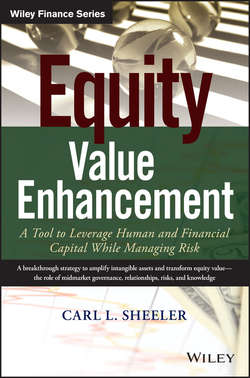Читать книгу Equity Value Enhancement - Sheeler Carl L. - Страница 9
На сайте Литреса книга снята с продажи.
Preface
Improving the Odds
ОглавлениеIt truly does take a village (ecosystem) to build and maintain a successful enterprise, whether an operational business or a portfolio of income-producing real estate. The endgame for most is leqacy and liquidity: that is, to sell or transfer part or all of their equity. Most investors in public companies buy and hold stock looking for capital appreciation (growth) and secondarily yield (income).
Ironically, most private company owners/executives do not know the market value of their companies, nor do their advisors. They have to think more like investors in their companies. Building value is an ongoing process of equity value enhancement, not simply managing sales and profits because they're easier to identify.
Savvy business owners will seek advisors who can best help them create value. Other owners will be complacent, accepting familiar over greater capability. Therefore, advisors have a critical responsibility to leverage governance, relationships, risk, and knowledge (GRRK) in client equity value enhancement (EVE). And business owners can foster success based on the advisors they select to counsel them.
As an example, it's important to seek professionals who are able to discern between economics, accounting, and finance backgrounds for a valuation expert. Each background differs, with financial expertise being more than merely generating or reporting numbers. These professionals must understand what produces results and reduces operational risk while elevating intangible value and what causes equity impairments. Arguably, the ideal valuation expert ought to possess a blend of strategy, operations, finance, and human behavior knowledge.
Further, there is a great difference between risks to an asset and risks within an asset. The prior is often tabled as asset-protection or preservation activity and the latter deals with risks inherent to the asset, its market, and its management.
These considerations would be inherent in any value creation plan. Focus on advisors who are proactive. (Most are reactive.) You may find it eye-opening to ask existing and potential advisors how they differentiate themselves. If you can swap their name or that of their firm with another name, they may not be adequately differentiating the influence of their knowledge and relationships to serve clients.
The ultimate holistic advisory team is likely to focus on elements of governance, relationship, risk and knowledge management and maintenance as a way to create value by leveraging intangible assets. It's not simply a financial capital game. It's a human capital one, too. It's about seeing what's driving operational performance. Values are more than numbers!
These are things an accountant, attorney, wealth advisor, insurance professional, or banker individually may not know – and may be unlikely to ask – so that's why a diverse advisory team is optimal. The ultimate advisory team is one that helps a company play an “A” game versus one that benefits from a company client that is playing their “A” game – a symbiotic versus a parasitic relationship.
